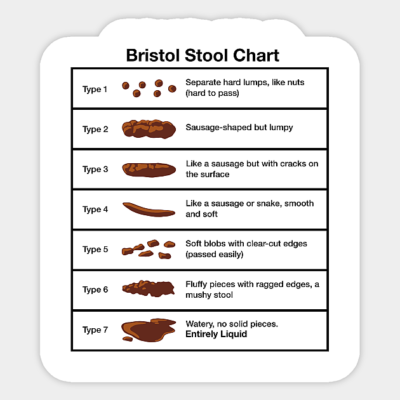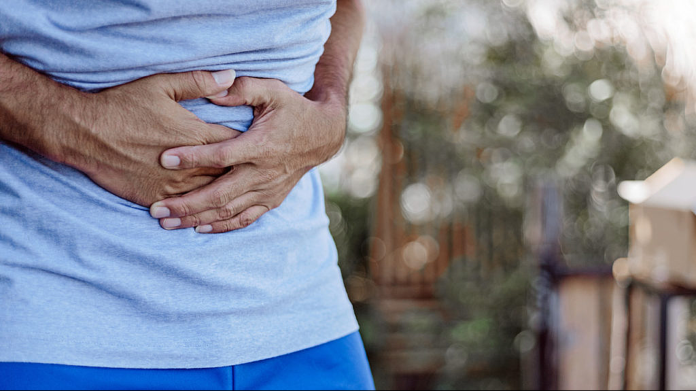Diarrhea is a common problem. Researchers estimate that about 179 million cases of diarrhea occur in the United States each year. Seasoned adults, particularly those older than 65, are particularly susceptible to the ailment.
What is diarrhea?
The digestive system breaks down everything you eat and drink to absorb nutrients and make the energy your body needs. Whatever solids can’t be broken down and used get excreted as poop which comes in many shapes, sizes, colors and consistencies.
The Bristol stool scale is oftentimes used by physicians to grade poop texture. It goes from Type 1 – separate hard lumps – to Type 7 – liquid with no solid pieces. The texture of the best poops, Type 4, resembles a mushy banana. When your poop is loose and watery and comes out that way at least three times a day, you have diarrhea. It can be uncomfortable and inconvenient, because diarrhea tends to come out quickly and with little warning.
By the time food passes out of the stomach, it’s a liquid that travels through the small intestine, where nutrients are absorbed. The leftovers flow into the large intestine, where water is absorbed and poop forms. When the small intestine or the large intestine can’t do its job, poop will be liquid.

Beware of bad germs
Diarrhea usually occurs because of infections caused by many different viruses, bacteria, and parasites. That’s why there are rules about keeping drinking water clean and food safe. It’s also why you should wash your hands before eating.
These germs cause diarrhea a few different ways. Often, they irritate the intestines, interfering with water absorption. Some germs cause diarrhea by releasing chemicals that make the intestines release fluid, making poop even more watery. When these germs come from food, symptoms can include vomiting, belly pain and diarrhea.
To be sure, not all microbes are bad.
In fact, your digestive system is filled with billions of bacteria and other germs that help you digest food and protect you from bad germs. Taking antibiotics for an infection can cause diarrhea by killing off these good bacteria along with the ones that originally made you sick. But people usually get better once they finish prescribed antibiotics and the good bacteria have a chance to recover.
People with diarrhea need to consume lots of liquids to stay hydrated. Water is best. Avoid juice and soda, which can worsen diarrhea. Also refrain from foods that can make your digestive system work harder, like dairy products.
Eating sweet potatoes, oats, beets and other high-fiber foods may help firm up loose poops. Never take a medication, even if doesn’t require a prescription, for diarrhea without asking a doctor first.
Other causes
There are many other causes of diarrhea. Some people are born with or develop conditions over the course of their lives that can cause diarrhea. A common example is lactose intolerance. Lactose is a sugar that is in milk that requires a special enzyme, called lactase, to digest it in the small intestine. There are people who have little, or even none, of this enzyme in their small intestine. As a result, lactose travels into their large intestine without being broken down and absorbed – leaving poop very runny.
Celiac disease can also trigger diarrhea. People with it have trouble digesting gluten, a protein found in wheat and additional grains. For people with celiac disease, eating gluten can damage the small intestine by activating their own immune system. This damage is reversible through a gluten-free diet, but diarrhea may continue until the small intestine heals and can do its job.
Others have digestive system allergies. They need to avoid eating specific foods to prevent diarrhea and other symptoms.
Some medications make you poop more often.
There are also medical conditions, like inflammatory bowel disease, such as Crohn’s disease and ulcerative colitis, in which the small intestine, large intestine or both become inflamed over a period of time.
Even your brain can play a role: Experiencing anxiety or getting stressed out can bring about loose poops. Some conditions, like irritable bowel syndrome, where the brain and the intestines do not communicate well with each other, can lead to belly pain and diarrhea, particularly amid stress.
Certain cancers and some tumors can cause diarrhea too.
Finally, for some people, eating spicy or fatty food or consuming artificial sweeteners or large amounts of caffeine can result in diarrhea.
Even if you find it disgusting, it is recommended that you pay attention to your poop. If you’re having diarrhea all the time, rather than occasionally, you may need to see a doctor.
Dr. Hannibal Person, M.D. is an Assistant Professor of Gastroenterology and Hepatology at the University of Washington School of Medicine and the Medical Director of the Gut-Brain Health Program at Seattle Children’s Hospital. Dr. Person also writes for The Conversation.











